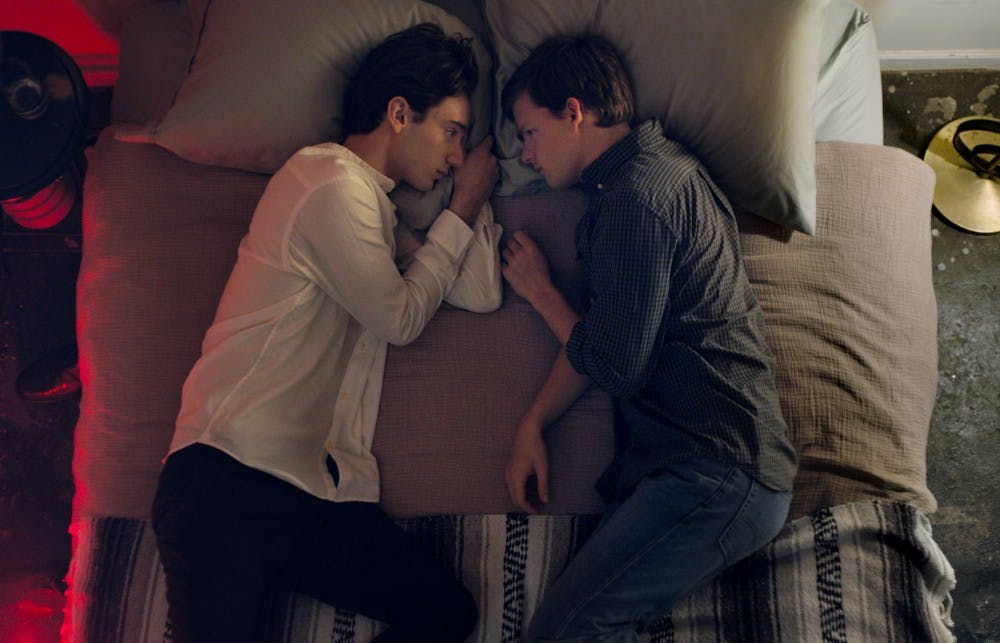I laughed many times watching “Boy Erased,” much to the presumable frustration of the four other theater patrons suffering through this horrid ordeal of a film with me.
I laughed once at the unintentional hilarity of a scene where Lucas Hedges, the wannabe twink who plays the film’s lead, hurls rocks at a poster of a sexy male model and screams obscenities to the heavens.
I laughed again, in uncomfortable frustration, when it occurred to me not only is Joel Edgerton, the filmmaker behind this queer film a straight, white man who’s likely never come across oppression once in his life, but he also plays the most violently homophobic role in the film.
But mostly, I felt dismay. Dismay that queer suffering is still a go-to in silver-screen stories about queer people, dismay that queer authorship remains devastatingly absent in such stories and dismay that “Boy Erased,” which will remain one of the year’s worst pictures, has little to offer but pain, hatred and ugliness.
The new film, about the suffering of a young gay man enrolled by his deceitful parents in a conversion therapy program, feels like a needless story because it is adapted by a straight man from a memoir by a gay man. The source material recounts a man’s painful experiences growing up gay and Christian, but one presumes that in its first person narrative there is purpose and catharsis to the painful memories dredged up.
The life of the real “Boy Erased” is no doubt a tumultuous one, but it is also one full of triumph and hope. Garrard Conley, called Jarred Eamons in the film, was raised by a fundamentalist Christian family and forced through intensive “corrective therapy” and conversion programs, but he also emerged still in touch with himself and grew into a downright inspirational figure. Now a successful author, he wrote about his experiences to bring awareness to the evils of conversion therapy, and his became a voice of hope and honesty for a great many.
However, hope and honesty are nowhere to be found in “Boy Erased,” which distills the experiences of his life to a garbage heap of pain and ugliness, content to wallow in the suffering of a great many and to mistake that suffering for purposeful emotion. There is nothing cathartic about “Boy Erased,” and if it has anything to offer anyone — I would contend that it does not — it is solace for those who don’t see themselves onscreen, either in the suffering queer youths in their metaphoric and occasionally very real caskets, or in the violently homophobic adults who surround them.
One wonders if Edgerton directed the movie and took on the role of the camp’s cold-hearted minister for some sort of selfish personal gain. Does he value himself more having so directly held his own image to that of such an evil man? Does he have anything to gain or offer beyond that from the selfish act of claiming this queer story as his own to tell?
There are sparing moments of beauty and hope in “Boy Erased,” but they are few and far between. In one, a character who deserves no redemption is given it in an act of facetious atonement so hollow and worthless that it appears for a moment to be genuine, before crumbling under the weight of its own faux-thoughtful moralizing.
In another, the film’s protagonist finds a brief respite from his suffering in the company of another young man. In such moments Edgerton reveals a capacity for quiet optimism and tenderness that is sorely missing from the rest of this otherwise compassionless film.
“You never asked if there was more to my story,” a stone-faced Lucas Hedges asks his father, a pastor, in a scene that feels like it ought to be cathartic or at least climactic, but ultimately feels like a half-hearted dress rehearsal performance. He might as well be asking it of Edgerton, who took the achingly hopeful story of a man who overcame pain and oppression, found solace in small moments where others might not have looked and ultimately used his voice and channeled his pain for good, and has pared it down to only the moments of ugliness and pain.
Perhaps there was once a time when a representation-starved queer audience might have tolerated such a disgrace of a film.
But in the midst of a slew of gently hopeful queer stories like “Moonlight,” “Call Me by Your Name,” “God’s Own Country” and even the recent and similarly-premised “The Miseducation of Cameron Post,” this wretched and dogged straight-authored piece of trauma porn simply will not stand.




